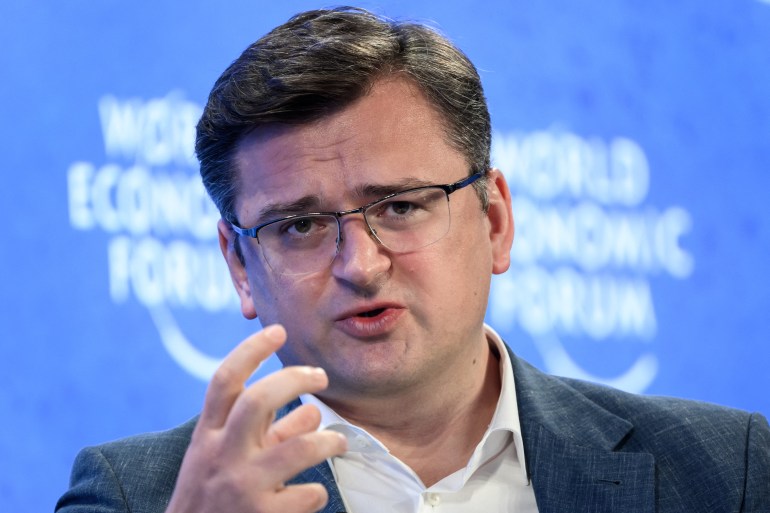Time running out for Ukraine grain exports from blocked seaports
Ukraine’s Black Sea ports remain blockaded by Russian warships since Moscow’s invasion of Ukraine began on February 24.
![A Ukrainian farmer wears body armour and helmet while working fields in the Zaporizhzhia region, Ukraine in April 2022 [File photo: Ueslei Marcelino]](/wp-content/uploads/2022/05/2022-05-25T050024Z_1096746514_RC2VUT9F3RN9_RTRMADP_3_UKRAINE-CRISIS-GRAINS-FUEL.jpg?resize=770%2C513&quality=80)
Time is running out to export some 22 million tonnes of grain out of Ukraine before the country’s new harvest as Russian forces continue to blockade the country’s Black Sea ports, Ukrainian officials said.
Ukraine’s Black Sea ports have been blocked since Russia sent thousands of troops into Ukraine on February 24 and millions of tonnes of grain remain stuck in silos in the country.
Keep reading
list of 4 itemsAll women, children, elderly out of Mariupol steel plant: Ukraine
UN chief expected to disclose talks on Ukraine grain exports
‘Brink of starvation’: Russia pressed to release Ukraine grain
There is now no room to store the country’s next grain harvest and warnings of a global food crisis are growing. Russia and Ukraine together account for nearly one-third of global wheat supplies, while Ukraine is also a major exporter of corn, barley, sunflower oil and rapeseed oil.
“We have about maybe a month and a half before we start to collect the new harvest,” Ukrainian lawmaker Yevheniia Kravchuk said on Wednesday on the sidelines of the World Economic Forum in Davos, adding there was insufficient space to store the fresh harvest.

Before the Russian invasion, Ukraine was seen as the world’s breadbasket, exporting 4.5 million tonnes of agricultural produce per month through its ports, accounting for 12 percent of the planet’s wheat, 15 percent of its corn and half of its sunflower oil.
But with the ports of Odesa, Chornomorske and others cut off from the world by Russian warships, the grain supply can only travel on Ukraine’s congested land routes that are far less efficient.
Ukraine’s Foreign Minister Dmytro Kuleba accused Russia on Wednesday of trying to “blackmail” the international community by raising the possibility of unblocking Ukraine’s Black Sea ports in return for a relaxation of sanctions against Russia.
The Interfax news agency earlier cited Russian Deputy Foreign Minister Andrei Rudenko as saying Moscow is ready to provide a humanitarian corridor for vessels carrying food to leave Ukraine, in return for the lifting of some sanctions.
‘Clear blackmail’
“So this is a clear blackmail, you could not find a better example of a blackmail in international relations,” Kuleba said in an address at Davos.
The foreign minister said that without the export of grain currently sitting in silos inside the country, there will be nowhere to store the next harvest.
“And while there will be a food crisis unfolding in some parts of the world, Ukrainian grain will be getting rotten under open skies,” he said.
“If this problem is not resolved, Ukrainian farmers will not plant another crop and the whole agricultural cycle in Ukraine will be interrupted, and that will mean a multi-year food crisis,” he said.
European Commission Chief Ursula von der Leyen on Tuesday called for talks with Moscow on unlocking wheat exports trapped in Ukraine by the sea blockade.
UK Defence Secretary Ben Wallace also called on Moscow to release grain stocks stuck in Ukrainian ports “in the spirit of humanity”.
Russia was “potentially starving many countries around the world of grain”, Wallace said during a visit to Madrid on Wednesday.
“People around the world are relying on that grain to feed themselves,” he said, citing Libya and Yemen as examples of nations especially reliant on Ukrainian grain.
Mariupol port reopens
Russia said Wednesday that the port of the southern Ukrainian city of Mariupol has reopened after Moscow’s troops took control of the city after a weeks-long campaign against Ukrainian defenders who had remained at the Azovstal steel plant.
Russia’s defence ministry spokesman Igor Konashenkov told a news briefing that the port has “started functioning normally” after demining was carried out.
Mariupol’s new Moscow-appointed city chief, Konstantin Ivashchenko, said on Russian television that a ship carrying about 3,000 tonnes of metal products will soon depart from the port to the southern Russian city of Rostov-on-Don.
Ivashchenko said that “demining is taking place in the city, particularly in the commercial seaport and its waters”.
The port has taken on 4,000 workers, Ivashchenko said.